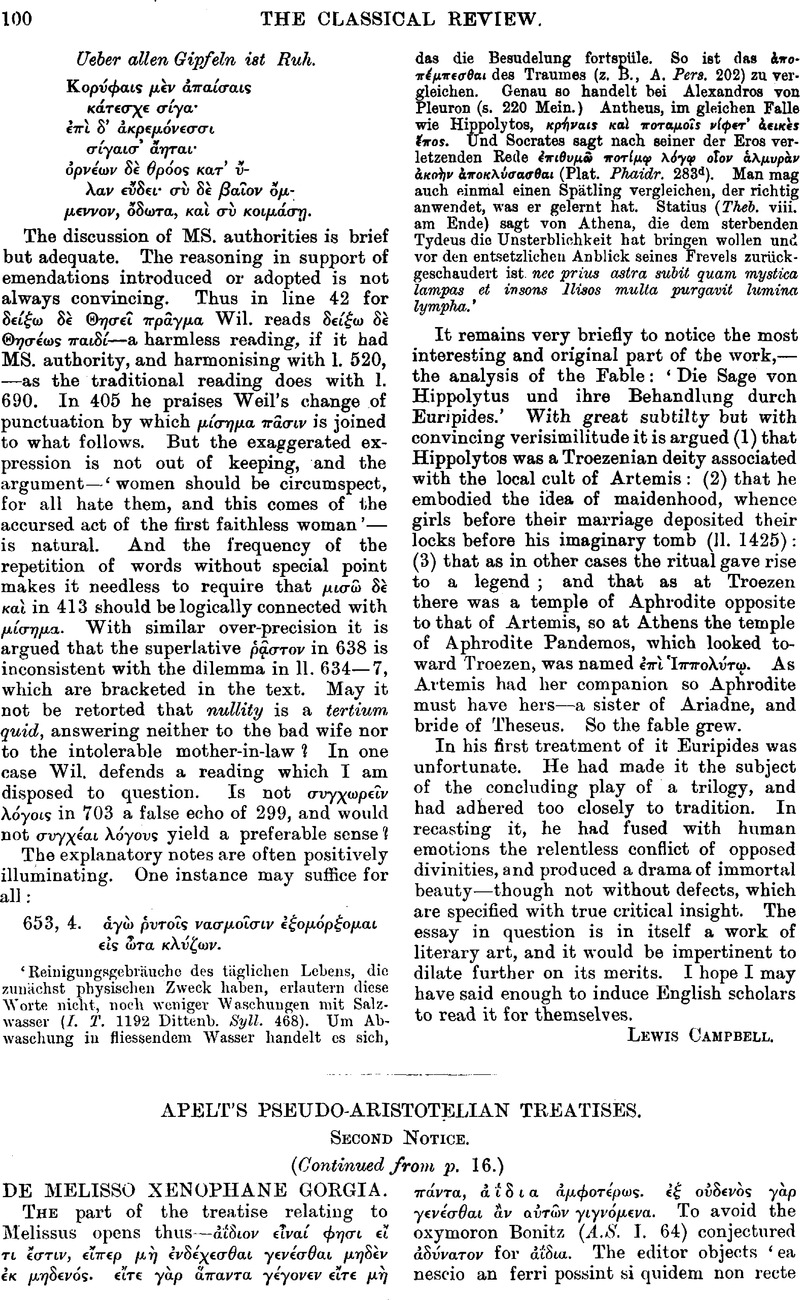No CrossRef data available.
Article contents
Apelt's Pseudo-Aristotelian Treatises
Published online by Cambridge University Press: 27 October 2009
Abstract

- Type
- Review Article
- Information
- Copyright
- Copyright © The Classical Association 1892
References
page 101 note 1 One of the references given in the Index Aristotelicus under ἄπειρον. Ἀδνατον is very near in use to ἄπειρον—cf. Phys.]85a 29 (a reference in the same index under δνατον) ![]() —and one may ask therefore whether δνατον without an adverb or a verb expressed with it could not be construed simply with εἰ like ἄπειρον (e.g. in this place from the Physics). However there seems to be no such instance among the references given for δνατον in the principal indices to Aristotle, Plato, and the Greek Orators.
—and one may ask therefore whether δνατον without an adverb or a verb expressed with it could not be construed simply with εἰ like ἄπειρον (e.g. in this place from the Physics). However there seems to be no such instance among the references given for δνατον in the principal indices to Aristotle, Plato, and the Greek Orators.
page 102 note 1 Cf. Frag. 5 (Mullach), and e.g. the well-known passage of Parmenides:
![]() .
.
page 103 note 1 The same is done in the Fragments of Melissus, Nos. 3 and 10, Mullach. On the latter Simplicius (eit. Mullach) comments thus: ![]() .
.
page 103 note 2 Simplicius notes on the ποτέ which occurs in Fragment ![]() .
.
page 104 note 1 The fallacia consequcentis, of which a wrong account is given in Mansel's Aldrich, both in the text and the notes.
page 104 note 2 It is hardly necessary to assume with Zeller that this implies Aristotle construed the beginning of Fr. 2 wrongly, taking ![]() as apodosis to
as apodosis to ![]() whereas it is a part of the protasis of which
whereas it is a part of the protasis of which ![]() is the apodosis. In the first place it is by no means certain that this would be a misconstrue (we should perhaps read
is the apodosis. In the first place it is by no means certain that this would be a misconstrue (we should perhaps read ![]() , cf. Fr. 5 init.
, cf. Fr. 5 init. ![]() ., or, with Diels,
., or, with Diels, ![]() ), and in the second place the inference ascribed by Aristotle to Melissus is found clearly enough in Fragment 7.
), and in the second place the inference ascribed by Aristotle to Melissus is found clearly enough in Fragment 7.
page 104 note 3 Zeller's interpretation ‘Wenn das Seiende der Grösse nach. beschränkt wäre, könnte es nicht ewig sein’ would require ἄπειρον instead of ![]() .
.
page 104 note 4 The passage from Simplicius is quoted by Mullach.


